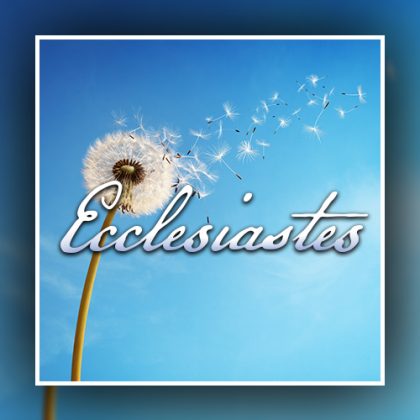
Description
INTRODUCTION TO ECCLESIASTES
The Latin meaning for the word “Ecclesiastes” is “speaker before an assembly,” and the English translation is “preacher.” You will note that the word “preacher” is used several times in the book of Ecclesiastes. In this book of the Bible, the “preacher” is telling the assembly. (or reader), that it is mere “vanity” and “vexation of spirit,” to try to find happiness and contentment apart from God. We learn that a person can be the most wealthy and wisest person “under the sun,” and yet be most miserable if he does not fear God and obey His commandments. Please notice that the author is writing about life now, in the present time, “under the sun.” Note that in 1:3, 9 and 14, the words, “under the sun,” are used. In fact, these three words are used over 300 times in the book of Ecclesiastes.
The author of Ecclesiastes is Solomon, King David’s son, who was also a king in Jerusalem, (Ecclesiastes 1:1, and 12). Solomon is known as the wisest man on earth, (I Kings 4:29 – 34, and Ecclesiastes 1:16). He probably wrote this book later in life after he had sought and obtained earthly wisdom, pleasure, and power. Some theologians say that he wrote the book of Song of Solomon in his youthful years, the book of Proverbs in his middle ages, and the book of Ecclesiastes in his later years.
The book of Ecclesiastes reveals that a life lived without God (or the Lord Jesus Christ) is only vanity and vexation of spirit. The preacher used these expressions several times in relating how empty life is without God. Perhaps as you read this book, you might think of how your life seems to be vain, and so empty, as you try to live your life apart from God. Earthly wisdom, human achievement, riches, pleasure in sin, the use of alcohol and drugs, and immoral actions all end with emptiness and unhappiness, and will eventually bring destruction. These bring you no lasting peace, joy or happiness. Hebrews 11:25 says that pleasure in sin is only for a season; meaning that this pleasure is short lived. Then come sorrow, emptiness, and destruction. The world, the flesh, and the devil try to hide the truth about sin to all who are “under the sun.” When one looks at life from the standpoint of the natural man, one comes to the same conclusion as Solomon when he said, “Vanity, vanity, all is vanity.” However, when one looks at life from the view point of one who has put his total trust and faith in God and in the Lord Jesus Christ, one realizes that life is a precious gift from God. Therefore, if you have not already, you should repent of your sin, and put your full faith and trust in the Savior, the Lord Jesus Christ, and commit your life to pleasing Him.
As you read through the book of Ecclesiastes, you may become a little discouraged and begin to wonder about the true meaning of life, and ponder whether life is really worth living, considering that everything seems to be in vain. However, you must realize that this conclusion is drawn from the perspective of a person who was not living to please God, but to please his own fleshly desires. Read the second chapter of Ecclesiastes very carefully. You will see that the author, Solomon, gave his life to seeking wisdom, pleasure, possessions and wealth, only to find that these things do not satisfy the soul of man. However, he finally realized that the real purpose of life is living to please and honor God, and he concluded the whole matter in chapter twelve of Ecclesiastes. Read and study this chapter carefully. He admonishes the young person to remember his Creator, God, in the time of his youth, and then relates several problems that happen to a person as he reaches old age, and can no longer function as he once did in his younger days. In the life everyone has problems and difficulties to face. There are situations and circumstances which we do not understand. The answer to the problems of life is found in verses thirteen and fourteen of chapter twelve of Ecclesiastes. We are to fear God, and keep His commandments, remembering that one day each of us will be judged, when God will bring every work into judgment, whether it be good of whether it be evil. A life for the Lord Jesus Christ will never be lived in vain.
Some other verses to read and study which will help you, are the following: Mark 8:36; Luke 12:15; 8:14; 9:24; 18:29 – 30; 21:34 – 36; Galatians 6:7, 8; John 16:33; Romans 8:35 – 39; I John 5:4 – 5.
To take this course please click the “Take this Course” button below. Then scroll down and click the first lesson.
You will need to take the chapter lessons in order. After you complete the first lesson quiz, you will then be able to take the quiz for the next lesson.

